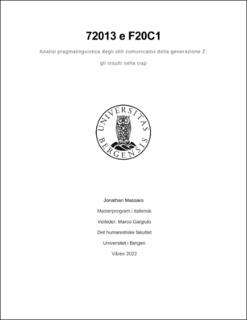72013 e F20C1 Analisi pragmalinguistica degli stili comunicativi della generazione Z: gli insulti nella trap
Master thesis
Permanent lenke
https://hdl.handle.net/11250/2999375Utgivelsesdato
2022-05-20Metadata
Vis full innførselSamlinger
- Master theses [213]
Sammendrag
Gli insulti fanno parte del patrimonio linguistico di ogni cultura e attraverso il loro studio sul piano diacronico e sincronico è possibile ricostruire il contesto culturale, sociale e storico di appartenenza. La strategia dell’insulto appare predominante all’interno di un sottogenere musicale, la trap, la quale rappresenta lo stile maggiormente ascoltato dai giovani appartenenti alla cosiddetta Generazione Z, ovvero i nati tra la fine degli anni ’90 e i primi anni ’10 del 2000. L’obiettivo di questa tesi è quello di provare a capire se il massiccio uso di insulti nei testi di musica trap siano semanticamente riconducibili al loro uso tradizionale o se sono il risultato di una risemantizzazione funzionale al gruppo di riferimento per processi di appartenenza e identificazione, e per motivi ludici. Nella prima parte, il mio studio si è focalizzato sull’analisi delle teorie degli studi sulla pragmalinguistica. Poiché la lingua è alla base delle complesse interazioni sociali, e tramite il suo utilizzo gli esseri umani si districano nella rappresentazione del sé individuale e collettivo, i testi delle canzoni rappresentano una fonte di espressione per l’affermazione e l’accettazione di un individuo all’interno della società. In tal senso, le parole in musica rappresentano un veicolo per l’espressione delle emozioni e delle identità, veicolando modelli soprattutto tra i gruppi delle culture e subculture giovanili. Nella seconda parte è stata analizzata l’evoluzione storica e linguistica del movimento hip hop, dal quale sono nati il rap e successivamente la trap. Da tale analisi, in conclusione, sono emersi due punti fondamentali: 1) la trap, come il rap e il mondo hip hop in generale, possiede caratteristiche di ribellione nei confronti delle istituzioni e della società di appartenenza; in questo caso i trapper lottano contro le etichette morali di una società massificata, giocando a provocarla con gli eccessi semantici inversi: il genere diventa fluido e le parole ne seguono il flusso; 2) la trap, appartenendo a un genere musicale con un pubblico di riferimento specifico, la Generazione Z, utilizza un insieme di regole e stili comunicativi condivisi, compresi e accettati da quel gruppo, nel quale l’outgroup, chi non appartiene a quella generazione, è percepito come estraneo e come tale non può comprenderne i valori e i linguaggi. In questo contesto, gli insulti fanno parte del codice comunicativo ed espressivo della musica trap, non risultando offensivi per tutti gli appartenenti al gruppo di riferimento, e in maniera opposta a chi non ne fa parte. L’analisi di questo linguaggio potrebbe prevedere un’evoluzione in un genere differente nei prossimi anni e potrebbe essere interessante valutarne il lascito. Insults are part of the linguistic heritage of every culture and through their study on a diachronic and synchronic level it is possible to reconstruct the cultural, social and historical context to which they belong. The strategy of the insult appears predominant within a musical sub-genre, the trap, which represents the most listened style by young people belonging to the so-called Generation Z, i.e., those born between the end of the 90s and the early 10s of 2000. The goal of this thesis is to try to understand if the massive use of insults in trap music lyrics is semantically attributable to its traditional use or if it is the result of a functional re-semantization to the reference group for processes of belonging and identification, and for ludic reasons. In the first part, my study focuses on the analysis of the theories of pragma linguistics studies. Since the language is the basis of complex social interactions, and through its use human beings extricate themselves in the representation of the individual and collective self, the lyrics of the songs represent a source of expression for the affirmation and acceptance of an individual inside the company. In this sense, words in music represent a vehicle for the expression of emotions and identities, conveying models especially among groups of youth cultures and subcultures. In the second part, the historical and linguistic evolution of the hip hop movement is analyzed, from which rap and subsequently trap was born. In conclusion, two fundamental points emerge from this analysis: 1) trap, like rap and the hip hop world in general, has characteristics of rebellion against the institutions and society to which it belongs; in this case the trappers fight against the moral labels of a mass society, playing to provoke it with inverse semantic excesses: the genre becomes fluid and the words follow its flow; 2) the trap, belonging to a musical genre with a specific target audience, Generation Z, uses a set of shared rules and communication styles, understood and accepted by that group, in which the outgroup, who does not belong to that generation, is perceived as a stranger and as such cannot understand its values and languages. In this context, insults are part of the communicative and expressive code of trap music, not being offensive to all members of the reference group, and in the opposite way to those who are not part of it. The analysis of this language could foresee an evolution in a different genre in the coming years and it could be interesting to evaluate its legacy.
